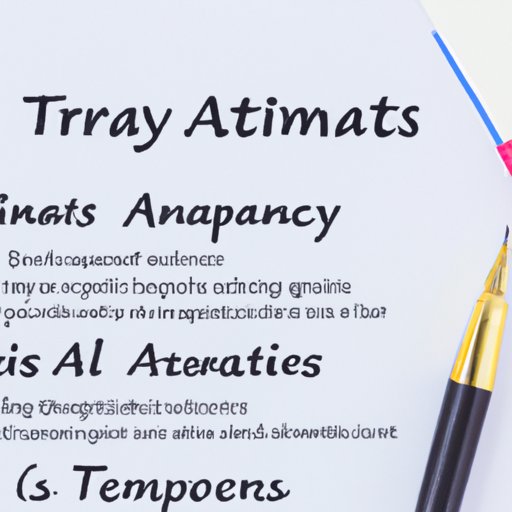
I. Introduction
Writing an analysis essay is an important part of academic and professional writing. The purpose of an analysis essay is to examine a specific topic or idea and break it down into smaller components to better understand it. In this article, we will define what an analysis essay is, outline the process of writing one, provide tips on what to avoid, answer common questions and provide examples of successful analysis essays to help readers see the essay type in action.
II. Defining an Analysis Essay
An analysis essay is a type of writing that requires a detailed examination and evaluation of a particular topic or idea. In essence, you are breaking down a complex topic or idea into smaller, more manageable pieces, in order to better understand it and present it to the reader in a clear and concise manner.
To write an effective analysis essay, there are a few key elements to keep in mind. Firstly, the writer should have a clear understanding of the topic or idea that they are analyzing. Additionally, the essay should be well structured, with a clear introduction, body, and conclusion. Finally, the writer should have a strong and compelling argument that is supported by relevant evidence.
Analysis essays can be written on a wide range of topics, from literary analysis to scientific research. Some common topics that can be analyzed include books, movies, historic events, scientific theories, and art.
III. Explaining the Process of Writing an Analysis Essay
Writing an analysis essay can be a challenging process, but with a step-by-step approach, it can be made easier. The following is a process that can be used to write an effective analysis essay:
- 1. Topic Selection: Choose a topic that is relevant and interesting, and that has enough depth to be analyzed.
- 2. Research: Conduct thorough research on the chosen topic, gathering relevant information and taking detailed notes.
- 3. Outlining: Create an outline of the essay to better organize the information gathered during research.
- 4. Writing: Use the outline to write the essay, following a clear introduction, body, and conclusion format.
- 5. Editing: Review and edit the essay to ensure it is well structured, clear, and concise.
When writing an analysis essay, it is important to keep in mind the overall structure and format of the essay. The introduction should introduce the topic and provide relevant background information. The body of the essay should provide a detailed analysis of the topic, with each paragraph focusing on a different aspect of the topic. Finally, the conclusion should summarize the key points of the analysis and provide a final compelling argument.
IV. Providing Tips on What to Avoid While Writing an Analysis Essay
While writing an analysis essay, there are a few common pitfalls to avoid. One of the most important things to keep in mind is to not be too general in the analysis. The focus of the essay should be on analyzing specific components or aspects of the topic, not on generalizations about the topic as a whole. Additionally, it is important to provide sufficient evidence to support analysis and not rely solely on personal opinion.
Another important tip is to use proper language and tone in the essay. A formal, academic tone should be used throughout the essay, and any slang or informal language should be avoided. Finally, it is important to avoid leaving any questions unanswered in the analysis, as this can leave the reader confused and more questions than answers.
V. Addressing Common Questions About Analysis Essays
There are many common questions that come up when writing an analysis essay. First, many people wonder how long the essay should be. In general, an analysis essay should be around 500-800 words, although it may be longer for more complex topics.
Another common question is what types of sources to use for the essay. It is important to only use credible and reliable sources, such as academic journals, books, and reputable websites. In addition, it is important to properly cite all sources used in the essay to avoid plagiarism and give credit where credit is due.
VI. Examples of Analysis Essays on Different Topics
To better understand analysis essays, it can be helpful to examine examples of successful essays. One example is an analysis of Shakespeare’s play “Hamlet,” examining the character of Hamlet and his motivations throughout the play. Another example is a literary analysis of F. Scott Fitzgerald’s “The Great Gatsby,” examining the themes of the novel and their relevance in modern society.
When selecting a topic for an analysis essay, it is important to choose a topic that is both interesting and has enough depth to be analyzed. Examples of potential topics include the analysis of scientific research papers, analysis of historic events, or literary analysis of popular novels.
VII. Conclusion
In conclusion, writing an analysis essay can be a challenging but rewarding process. By following a step-by-step approach and keeping in mind the key elements of an analysis essay, writers can effectively present a detailed and compelling analysis of a wide range of topics.
By avoiding common pitfalls, addressing common questions, and examining successful examples, writers can gain a deeper understanding of analysis essays and improve their own writing.




